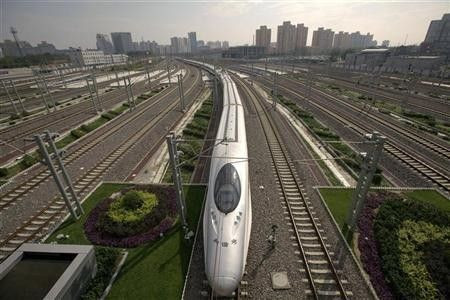Chinese Government Allows Rare Protest in Beijing Over High-Speed Railway

In a rarely seen event, Chinese officials in Beijing allowed a group of around 300 demonstrators to participate in a protest against the building of a high-speed railway from the capital to the northeastern city of Shenyang.
Protests in China, particularly in the political capital, are taken very seriously by police and officials. Demonstrations of any kind typically end in arrests and sometimes injury before activist groups get a chance to cause any real disruption.
However, Reuters reported a group of Beijing residents congregated on Dec. 9 for a rally against new plans for the high-speed rail line because of the excess noise and electromagnetic radiation the new tracks and power lines would bring to their eastern Beijing suburb.
According to Chinese news source QQ News, the rail line is understood to affect dozens of residential areas in Beijing's Chaoyang district. Several buildings are reported to be as close as 100 meters (328 feet) to the tracks, and one building as close as two meters (6 feet).
The completed Shanghai-Nanjing line has some residents worried: "I look along the Shanghai-Nanjing high-speed railway, residents reported an unbearable roar; very frightening," one Beijing resident said.
The protest disrupted a lot of local traffic when the group, comprised mostly of middle-class Chinese, briefly blocked an intersection, all under the eye of the police, before peacefully dispersing later in the afternoon.
So, is China learning the social practice of a peaceful protest?
Not quite.
Images from the protests on Chinese media suggest the protests were less peaceful than initially described as physical contact between protestors and police officials was made. Though police presence was still comparatively subdued at the scene, some protesters were confronted by plain-clothed policemen.
A report published on the Ministry of Environmental Protection's site said the Beijing-Shenyang high-speed rail had garnered the support of 37.27 percent of the local residents, a number that some protesters believe is inaccurate.
One man named Zhang told Reuters that he believes he was one of the people the government accounted for as approving of the construction.
"I only knew this line was planned two weeks ago when I got a letter from the government thanking me for my support," Zhang said. "But neither I nor any of the other residents support this. They are inventing things."
The lack of a heavy-handed reaction to the protests from police forces is likely the government's way of allowing for citizens to express their anger and taking credit for a more open China.
Chinese government officials did not respond to the allegations of the fabricated approval reports, but they would not be out of the realm of possibility. However, China's commitment to the development of infrastructure, particularly rail systems, has been unwavering, and construction likely would have continued with or without the approval of local citizens.
© Copyright IBTimes 2024. All rights reserved.





















